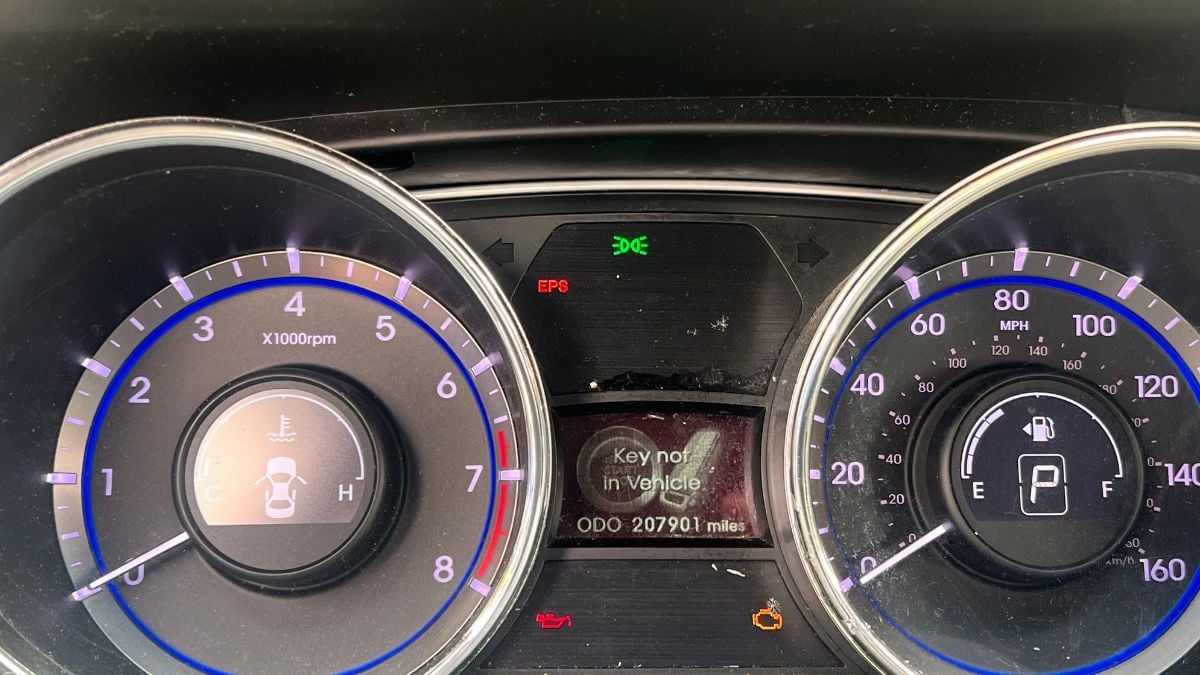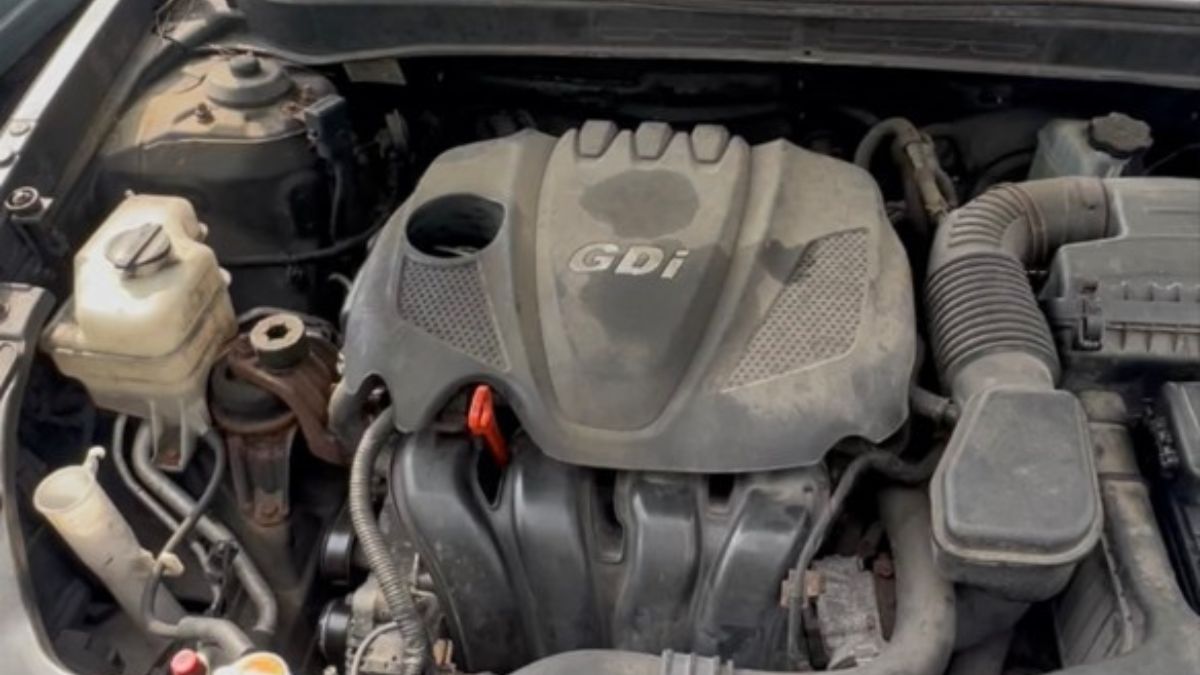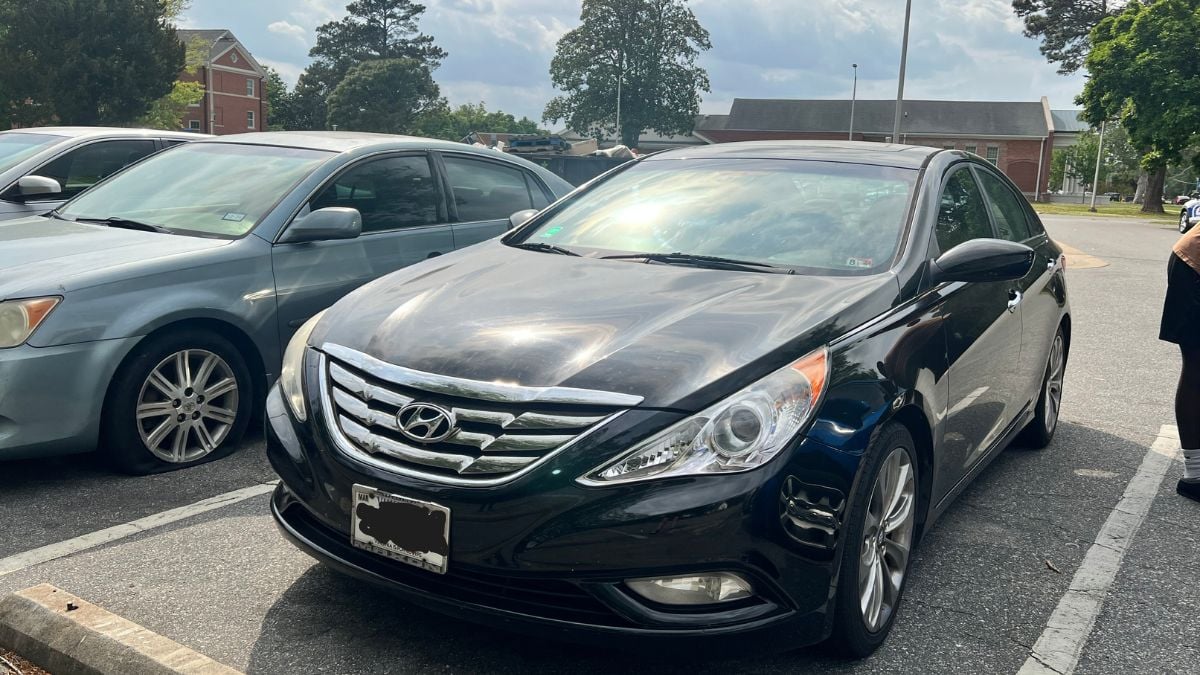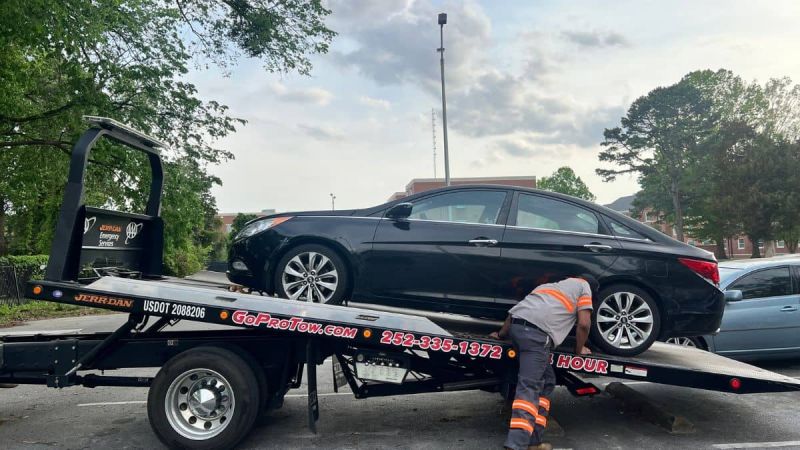When most people hear about Hyundai’s engine issues, they assume it’s old news, like something the company fixed years ago with recalls, extended warranties, and upgraded engines. But for one 2012 Hyundai Sonata owner I recently spoke with, that assumption couldn’t be further from reality. Jared Henderson just experienced his fourth engine failure, and yes, you read that right: four catastrophic engine failures, all under the same ownership, and all related to a defect Hyundai already publicly acknowledged and supposedly addressed.
Jared’s car currently shows around 207,000 miles on the odometer when I took the picture from inside his car, but what matters more is this: the most recent engine only lasted between 20 to 30 thousand miles before dying while driving. No warning lights, no dramatic build-up, just a sudden loss of power on the road. When he tried to restart the car, the starter spun, but the engine never turned over. That usually points to one thing: a seized engine. While getting his car towed the next day, I spent some time with him and asked if he would like to share his story, and to which he was more than willing. Here's him giving us some background:
"This car has been in the family since my mom bought it brand new. I honestly grew up with this car. Like my mom and sisters drove it for years before I got my hands on it, and so this is the first time this has happened while it's with me. Car has its original trans, which is still pushing on some 200k miles later, but this headache keeps happening. Even the engine replacements ain't saving this car. I'm just thinking of selling it now and leaving what seems to be a generational curse.”

After he told me his thoughts, I asked him what happened exactly the night before that led us here:
"Regarding what happened, I was just out trying to get some food, but while I was on the way back home, my car suddenly lost power and I just knew the engine was gone. The music was loud so I didn't really hear what happened. But after pushing it aside to a parking lot and trying to crank it again, it confirmed what I was thinking: The engine is cooked."

The Anatomy of a Seized Engine
If this sounds familiar, that’s because it is. The 2011–2014 Hyundai Sonata was at the center of a major recall and class-action lawsuit surrounding the Theta II 2.4L GDI engine, which was known for internal bearing wear that could restrict oil flow and lead to catastrophic engine failure. Hyundai responded by extending warranties, issuing software updates like the Knock Sensor Detection System (KSDS), and offering free engine replacements to affected owners.
But here’s the part most people don’t realize: some owners, like Jared, have received multiple replacement engines under warranty. In his case, Hyundai has now replaced the engine four times. Each failure has been covered, and each replacement was presumed to be the “final fix.” Yet here we are.

So what does it mean when an engine dies like this? When Jared turned the key and heard the starter spin without the engine cranking, he likely experienced a full engine seizure. Seizure happens when internal components like the crankshaft or pistons can no longer move due to extreme friction or blockage, usually from oil starvation. If the crankshaft doesn’t rotate, the pistons don’t move, and you don’t get compression.
Interestingly, the tow truck driver told us that the car still had compression, though that claim is questionable. While it’s possible for a partially failed engine to offer some resistance (mimicking compression), true compression requires crankshaft rotation, and that wasn’t happening here from what I saw. If anything, it underscores how difficult it can be to get accurate roadside diagnostics.
Jared had also just changed the oil prior to the failure, eliminating negligence as a cause. That further supports the theory that this was, once again, a defect-related failure and not a result of poor maintenance.
How Many Times Will Hyundai Cover the Same Problem?
One of the biggest surprises in this story is Hyundai’s willingness to cover this repeated failure under warranty. Many might assume that once an engine is replaced, future issues fall under a different policy. But Hyundai’s extended warranty, which is the result of lawsuits and public backlash, has allowed for multiple engine replacements if the failures are tied to the original defect. That includes covering replacements beyond the typical 10-year/120,000-mile window in many cases.
This isn’t just a theory. In fact, I just wrote another article not too long ago regarding an owner who's Hyundai Kona's engine blew up after just two years of owning the car. Warranty coverage has continued even after replacement engines fail early, but Hyundai seems to know that this problem isn't a one and done kind of deal.
Why This Problem Isn’t Going Away
Part of the reason this issue persists is because Hyundai and Kia’s Theta II engine was used in millions of vehicles. Despite recalls and updates, the problem is embedded deeply in the engine’s design. In fact, Hyundai had to issue a recall on already-replaced engines after discovering fuel lines were being damaged during the swap process, which is a frustrating reminder that even fixes can cause new problems.
In another case, newer Hyundai models that weren’t even part of the original Theta II engine recall have started experiencing eerily similar issues and raising deeper concerns about long-term durability. For example, a 2019 Hyundai Tucson with just 60,000 miles was reported to need a full engine replacement, prompting owners to question whether Hyundai has truly addressed the core issues that plagued earlier models.
The Emotional Toll of Driving an Unreliable Car
What sticks with me most from my conversation with Jared wasn’t the technical details, it was the emotional fatigue. After four engine failures, he told me he’s finally thinking of giving up on the car, and that his mom is leaning that way too. This isn't because he can’t afford to keep fixing it, because the warranty has made that relatively easy, but because he’s tired of not knowing when the next failure will happen.
The irony? He still likes the car. It’s served him well outside of this one massive issue. But living with that kind of mechanical anxiety is exhausting. For many, even a free engine replacement isn’t worth the stress of a fifth failure.
As someone who follows the auto industry closely, I think stories like this reflect something deeper than just a bad engine design. They show how automakers, even when they do the right thing by honoring warranties, can still leave lasting scars on customer trust. No one buys a car expecting to need one engine replacement, let alone four. Hyundai deserves credit for honoring the warranty, but the fact that the same failure happened repeatedly raises questions about the long-term effectiveness of their fixes.
I didn’t expect to cross paths with Jared or hear about a story this extreme, but I’m grateful he opened up and allowed me to share it. His experience sheds light on something deeper than just mechanical trouble as it touches on the emotional bond people form with their vehicles. Cars are meant to provide freedom, stability, and confidence. When they repeatedly fail, they slowly chip away at that trust, turning a once-reliable companion into a source of stress and uncertainty.
Key Takeaways and Lessons for Readers
- Even if your engine is replaced once under warranty, stay vigilant. Just because it’s new doesn’t mean it’s problem-free, especially if you’re driving a model involved in past recalls.
- Know your rights and recall coverage. Vehicles affected by widespread defects may still qualify for warranty work years after initial purchase. As shown in Hyundai’s case, replacements don’t always reset the risk.
- Don’t ignore subtle symptoms. Strange engine noises, delayed starts, or knocking could all be signs of bearing failure. Get them checked early.
- Even a "free" repair isn’t free if it costs your peace of mind. Long-term reliability matters. If a vehicle is on its fourth engine, it might be time to move on.
- Stay informed on evolving recalls. For example, Hyundai recently issued another massive recall impacting over 1 million vehicles due to ESP system failures, proving that safety and reliability issues are still being uncovered.
- Think about the kind of ownership experience you want. A car can be quick, comfortable, or full of features, but if it’s not reliable, those benefits fade fast. Even a great vehicle like the Hyundai Ioniq 6 Limited AWD can only shine if it fits the right use case and reliability expectations.
Now Let’s Hear from You:
Have you ever experienced a major failure like Jared has? How did your automaker handle it?
And would you keep a car after its second or third engine replacement? Or would that be your breaking point?
I'd love to hear your thoughts below.
Aram Krajekian is a young automotive journalist bringing a fresh perspective to his coverage of the evolving automotive landscape. Follow Aram on X and LinkedIn for daily news coverage about cars.
Image Sources: Aram Krajekian
Set as google preferred source












Comments
I have owned a 2013 Sonata …
Permalink
I have owned a 2013 Sonata carried it to the dealership for the fuel pump replacement that was recalled on the car about a week later I had to pay another mechanic for the problem that was supposed to be fixed.This is completely not something a person would think would happen. They should have replaced everything about the fuel pump. This car has 2 fuel pumps according to the mechanic who fixed it for me. It looked like the dealership had just put new hoses and clamps on the top part to make it appear like it had been fixed . In reality there was pressure on built up in the fuel pump and it had to be let out and it was trying to start at 1900 rpms and had to be reprogrammed. Thank God for honest people out there. Another thing that I had to experience was that the car had to be reprogrammed it was miss firing and driving horrible and it was giving a code out that the auto part stores could not tell what they meant. So I appreciate my local mechanic who had a machine that was able to read the code and being able to fix the problem and be willing to work with me if I thought it wasn't working correctly afterwards. Thank you INFINITE AUTO REPAIR!
Thanks so much for sharing…
Permalink
In reply to I have owned a 2013 Sonata … by Sonia Smith (not verified)
Thanks so much for sharing your story.
It’s certainly frustrating when a recall fix doesn’t actually solve the problem. Sounds like your local mechanic really went above and beyond, and it’s great to hear you found someone you can trust like Infinite Auto Repair!
Well, after reading this…
Permalink
Well, after reading this story about hyundai engine failure 4 times for one customer. I can finally breathe a sigh of relief, as I have a 2012 hyundai sonata 2.0 turbo that has already had a complete engine failure with a free engine replacement by hyundai but less than 2 years later I have another seized engine leaving me stranded and now 6 months without a vehicle because hyundai will not tow my vehicle and I have to come out of pocket for that, well during the time when the vehicle failed yet again, until now I have been dealing with the unexpected death of My mother among many other things including financial hardship, I have been unable to get my vehicle to the dealership leaving me completely stranded without a vehicle and its been taxing emotionally for me caused me anxiety and feeling just hopeless... so I can breathe a sigh of relief that hopefully the dealership I bought the vehicle from will honor a another engine replacement.
I’m really sorry you’ve been…
Permalink
In reply to Well, after reading this… by James Barela (not verified)
I’m really sorry you’ve been going through all of that James. May your mother rest in peace.
This all sounds incredibly overwhelming. No one should have to deal with car trouble on top of personal loss and hardship. I truly hope your dealership does the right thing and helps get you back on the road soon.
How does the starter spin if…
Permalink
How does the starter spin if the engine is seized? The writer of this article seems to have a minimal understanding and mechanical ability, yet tries to write about mechanical issues and explain to others, what they themselves have minimal knowledge of.
My suggestion is to stick with what you know!
Thanks for the feedback Bob…
Permalink
In reply to How does the starter spin if… by Bob Paul (not verified)
Thanks for the feedback Bob.I appreciate you pointing that out.
Just to clarify, Jared mentioned the starter engaged but the engine didn’t turn over. I was there trying to crank it with him and what we actually heard was the typical rapid clicking sound, which as you know, often happens when the starter can't crank a seized engine.
So while I originally used the word “spinning,” what I meant was that the starter was trying to engage, but the engine itself was locked up and wouldn’t rotate. I should’ve been clearer about that to avoid confusion. Thanks again for mentioning it!
We are awaiting diagnosis…
Permalink
We are awaiting diagnosis for a 2nd engine failure at 240,000 miles. first was at 120,000 on a 2011 Hyundai Sonata. The Winston Salem NC Bob King Hyundai doesn't have any appointments for 3 weeks. Without the diagnosis, we cannot get the free loaner car that we had last time. So we are down to our little sports car that is 2002 Beamer that the top won't go down. 🤣🤣🤣. I'm going to call Hyundai tomorrow.